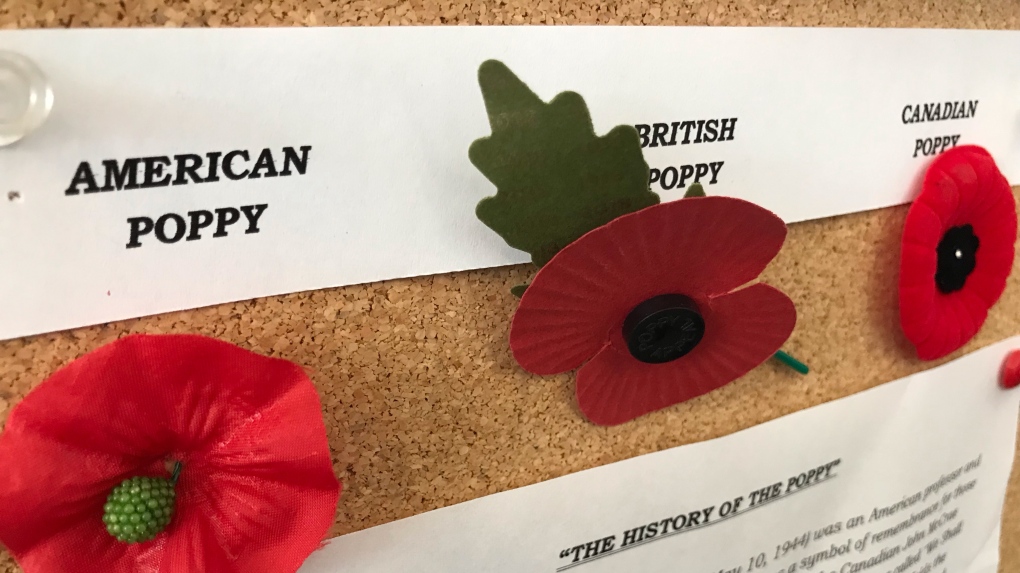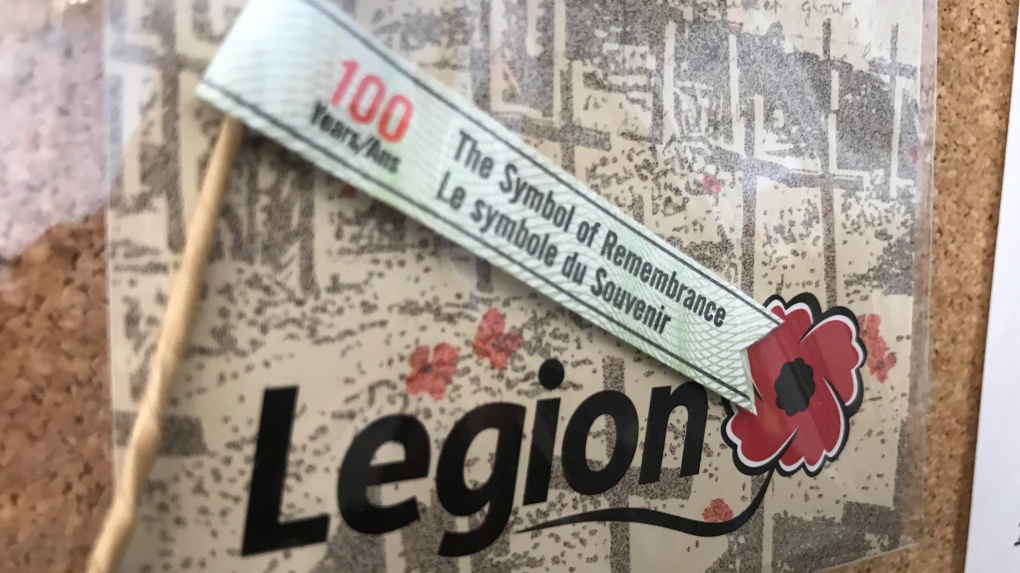Vintage and digital: Royal Canadian Legion celebrates the poppy's 100th birthday
The poppy pin, an international symbol of remembrance, was adopted in July 1921, according to the Royal Canadian Legion.
“It was 100 years ago that a lady from France actually had the idea to use the poppy as a symbol of remembrance,” says Nujma Bond, spokesperson for the Legion. “Her name was Anna Guerin and she was working in war torn regions of France.”
Bond says Guerin was inspired by John McCrae’s poem, “In Flanders Fields” and felt a pin was an easy way to remember all the lives being lost.
According to the Legion, Guerin ran a charity that was rebuilding “regions of France torn apart by the First World War and created poppies made of fabric to raise funds.”
Fast forward to 2021, and the Legion is paying homage to Guerin, with a new kind of poppy.
“It’s a cloth pin that looks like the original pin from 1921,” according to Bond.
It sells for $11.50 and can be purchased at local Legion branches in Windsor-Essex.
Meanwhile, the Legion will distribute 20 million traditional poppy pins across Canada this November.
“We don’t actually sell poppies,” says Archie Nielson past president of the Royal Canadian Legion Branch 594 in Windsor.
“We offer poppies for distribution or donation. We don’t put a dollar value on the poppy itself. It’s whatever people feel they can afford to give,” says Nielson.
“All of the funds raised locally, are used locally,” says Bond.
Bond says the services are free and available to any veteran, whether they are a member of that branch or not.
“They can receive emergency funding if they need it. They can receive help and advice on where to go if they perhaps need some sort of peer support. They can also have help filling out their forms that they need to fill out to receive benefits from Veterans Affairs Canada,” says Bond.
When asked about the wrong way to wear a poppy pin, Archie Nielson says there isn’t one, at least not in his opinion.
“If somebody is wearing it, I don’t care,” say Neilson. “As long as they’re wearing a poppy.”
The Legion is also bringing their campaigns into the digital era by creating a piece of online artwork called The Immortal Poppy.
“They actually gathered a genuine poppy from Flanders fields in Belgium,” says Bond. “That poppy was taken by an artist and reproduced digitally.”
100 copies of the digital art are for sale using crypto currency.
“Currently its valued at $550 Canadian dollars,” according to Bond.
“It’s a way to remember our veterans perpetually because this will remain online in the digital world forever.”
Inside the branch is a poster about the three different examples of poppy pins worn by people around the world.
 Poppy pins of remembrance from around the world are displayed at the Royal Canadian Legion Branch 594 in Windsor Ont. on Monday, Nov. 1, 2021. (Michelle Maluske/CTV Windsor)
Poppy pins of remembrance from around the world are displayed at the Royal Canadian Legion Branch 594 in Windsor Ont. on Monday, Nov. 1, 2021. (Michelle Maluske/CTV Windsor)
Gerry Ciurysek, a member of the 594 branch in Windsor drafted the following historical look at the poppy, in the lead up to the centennial.
“THE HISTORY OF THE POPPY”
THE AMERICAN POPPY:
Moina Belle Michael (August 15, 1869 – May 10, 1944) was an American professor and humanitarian who conceived the idea of using poppies as a symbol of remembrance for those who served in World War I. On 9 November 1918, inspired by the Canadian John McCrae battlefront-theme poem "In Flanders Fields", she wrote a poem in response called "We Shall Keep the Faith". In tribute to the opening lines of McCrae's poem – "In Flanders fields the poppies blow / Between the crosses row on row," – Michael vowed to always wear a red poppy as a symbol of remembrance for those who served in the war. After the war was over, Michael returned to the University of Georgia and taught a class of disabled servicemen. Realizing the need to provide financial and occupational support for these servicemen, she pursued the idea of selling silk poppies as a means of raising funds to assist disabled veterans. In 1921, her efforts resulted in the poppy being adopted as a symbol of remembrance for war veterans by the American Legion Auxiliary, and by Earl Haig's British Legion Appeal Fund (later The Royal British Legion) later that year.
Americans don't typically wear poppies on November 11 (Veterans Day), which honours all living veterans. Instead, they wear the symbolic red flower on Memorial Day—the last Monday in May—to commemorate the sacrifice of so many men and women who have given their lives fighting for their country.
THE BRITISH POPPY:
According to the Royal British Legion, the British Poppy represents all those who lost their lives on active service in all conflicts; from the beginning of the First World War right up to present day. It also honours the contribution of civilian services and the uniformed services which contribute to national peace and security and acknowledges innocent civilians who have lost their lives in conflict and acts of terrorism. According to the Royal British Legion; “there is no ‘correct’ way to wear a poppy”. Wearing a poppy is a personal choice reflecting individual and personal memories. It’s a matter of personal choice whether someone chooses to wear a poppy and how they choose to wear it. From paper poppies to pins, bag charms to pet poppies, and now on face masks, the best way to wear a poppy is simply with pride.
THE CANADIAN POPPY:
Canadians take intense pride in the Poppy, which was introduced as a symbol of the sacrifice of the soldiers and the hope of peace by the poem In Flanders Fields written by Canadian Lieutenant Colonel John McCrae, MD after the 2nd Battle of Ypres in April, 1915. This person from Guelph, Ontario, penned the Poem “In Flanders Fields” on a scrap of paper in May, 1915 on the day following the death of a fellow soldier. For Canadians, Ypres is special as it was our first real battle of WW1 and the number of casualties was shocking. There are 55,000 British and Commonwealth soldiers inscribed on the “Menin Gate Memorial to the Missing” a war memorial in Ypres, Belgium, as having no known grave. Their bodies still lie beneath the poppy-covered fields, perhaps contributing to the richness of these flowers. These were traditionally red, coincidentally the colour of their shed blood. The last line of the poem; “We shall not sleep, though poppies grow, In Flanders fields.” refers to the narcotic effect of poppies, which is outweighed by their mission of continuing to fight for freedom. Obviously no other flower of any colour can be substituted. This was 2 years before the American soldiers arrived, so it is logical that Canadians and British feel more strongly about the poppy and are most incensed at suggestions to change one of the characteristics that make the red poppy so appropriate. Everyone has red blood, despite different skin colours and gender; to tamper with this is an insult to those who died.
Note: All information gleaned from Wikipedia, internet articles, the Royal British Legion, & the Royal Canadian Legion. 2-20-2021
 The poppy pin of remembrance is 100 years old in 2021 shown on this display in Windsor, Ont. on Monday, Nov. 1, 2021. (Michelle Maluske/CTV Windsor)
The poppy pin of remembrance is 100 years old in 2021 shown on this display in Windsor, Ont. on Monday, Nov. 1, 2021. (Michelle Maluske/CTV Windsor)
CTVNews.ca Top Stories

W5 Investigates 'Let me rot in Canada,' pleads Canadian ISIS suspect from secret Syrian prison
W5's Avery Haines tells the story of Jack Letts, a Canadian Muslim convert in a Syrian jail, accused of being a member of ISIS. In part two of a three-part investigation, Haines speaks with Letts, who issues a plea to return to Canada to face justice.
Canadian woman shares methanol poisoning story in wake of death investigation in Laos hostel
Cuddling on the couch with her dog, Ducky, no one would notice that anything is different about Ashley King. Even when she walks across the living room, she doesn’t miss a step. But the 32-year-old has gotten used to functioning with only two per cent vision.
DEVELOPING Liberals, NDP expected to pass GST holiday in House of Commons today, without $250 rebate
Legislation to create a two-month-long GST holiday is expected to pass today after the federal finance minister separated the GST break from a promise to also send $250 to most working Canadians in the spring.
Montreal billionaire Robert Miller could have as many as 100 victims, lawyer says
A Quebec judge is hearing arguments this week in a class-action lawsuit application against Montreal billionaire Robert Miller over allegations he paid minors for sex.
A social media ban for under-16s passes the Australian Senate and will soon be a world-first law
A social media ban for children under 16 passed the Australian Senate Thursday and will soon become a world-first law.
DEVELOPING Lebanon says 2 hurt as Israeli troops fire on people returning south after truce with Hezbollah
At least two people were wounded by Israeli fire in southern Lebanon on Thursday, according to state media. The Israeli military said it had fired at people trying to return to certain areas on the second day of a ceasefire with the Hezbollah militant group.
It's expensive to visit the Maldives. Now it's more expensive to leave, too
The Indian Ocean archipelago nation of the Maldives, known for its white sand beaches and coral reefs, has just increased the price it costs to leave.
Dementia may arrive a decade earlier in men at high risk for heart disease, study finds
Being at higher risk of heart disease may cause dementia to appear in men a decade before it will occur in similarly at-risk women, a new study found.
Latest 'massive' Russian aerial attack cuts power to 1 million homes in Ukraine
Russia conducted a 'massive' attack against Ukraine’s energy infrastructure on Thursday, firing nearly 200 missiles and drones and leaving more than a million households without power, Ukrainian officials said.

































